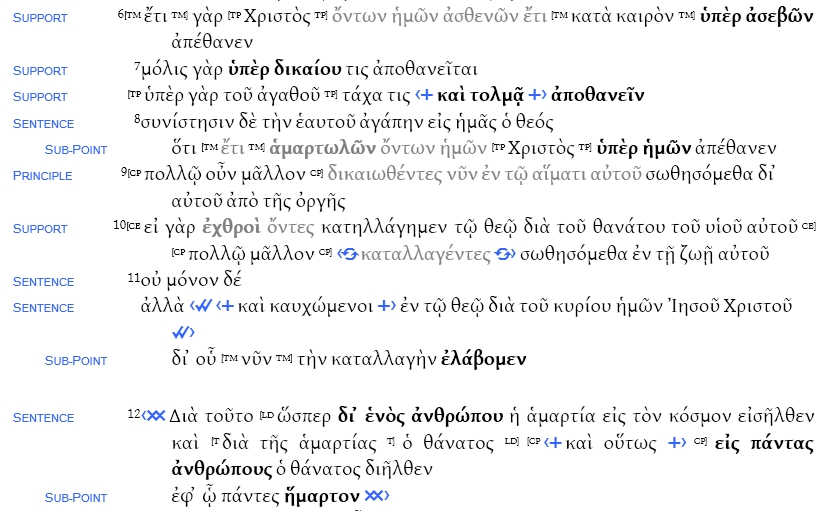Jonathan Robie wrote:ἔτι γὰρ Χριστὸς ὄντων ἡμῶν ἀσθενῶν ἔτι κατὰ καιρὸν ὑπὲρ ἀσεβῶν ἀπέθανεν
What's going on in this phrase? The basic meaning could have been expressed much more simply, and I'd like to better understand why Paul phrased it this way.
For instance, I assume Χριστὸς is strongly emphasized here by the fronting. What else is going on here?
This is a syntactically tough verse and it may be an example of an anacoluthon, with the repeated ἔτι.
"Enphasized" is probably not the best word because fronting has different functions. It could set a topic (what the sentence is about or its setting), or it could instantiate a focus (i.e. point out what the most meaningful part of the sentence is).
Here's how I would analyze the word order:
1. First, break up the sentence into intonation units, or cola (pl. of colon).
Often the word order gives clues to this. A genitive absolute usually gets its own colon. Enclitics and unemphatic pronouns are usually phonologically hosted by the first word. Adverbs are usually placed toward the beginning of their clauses.
In Rom 5:6, there is a genitive absolute, ὄντων ἡμῶν ἀσθενῶν. They often begin with the participle and the placement of pronoun confirms it. As for the right periphery of the genitive absolute, I think it does not include ἔτι.* So would analyze the cola of the verse as follows (using # as an intonation break):
an
ἔτι γὰρ Χριστός # ὄντων ἡμῶν ἀσθενῶν # ἔτι κατὰ καιρὸν ὑπὲρ ἀσεβῶν ἀπέθανεν
*(I realize this is at odds with most translations, which construe ἔτι with the present-stem participle ὄντων. I can see why they do this. It is entirely natural to construe ἔτι with a present-stem verb form, rather than the aorist ἀπέθανεν. Nevertheless, I think that construing ἔτι with ἀπέθανεν is plausible because that the way the word order tells me, and also with aorists ἔτι does construe with scalar verbs or numbers, and dying is on the extreme end of the scale of possible actions.)
2. Within each colon, look for the focus structure.
Generally, the focus will be broad if the verb is first and narrow if a constituent precedes the verb. Also, various topical constituents may precede the focus. Sometimes, an entire topic can be left-dislocated to its own colon, in which case there is no narrow or broad focus.
Thus, for ἔτι γὰρ Χριστός, we have two topicalized constituents. The adverb ἔτι is temporal (setting) and the Χριστός indicates that Paul is now talking about Christ.
For ὄντων ἡμῶν ἀσθενῶν, everything is the normal place, broad focus, and the whole participial clause is a temporal frame (setting).
For ἔτι κατὰ καιρὸν ὑπὲρ ἀσεβῶν ἀπέθανεν, we have two adverbs of time--probably temporal frames (setting), plus a narrow focus on ὑπὲρ ἀσεβῶν, followed by the verb ἀπέθανεν, something like "at the right time, it is us he still died for." The lack of an article before ἀσεβῶν strengthen the finding that ὑπὲρ ἀσεβῶν is in focus.
The information structure in v.8 is different. Paul is already talking about Christ, so he does not need to topicalize it as he did in v.6
Stephen C. Carlson, Ph.D.
Melbourne, Australia
